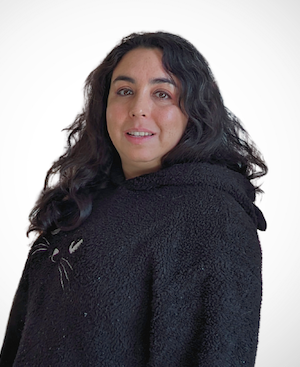Lucía Rodríguez Mota, a Mexican-born artist, is shaping the American art scene through her poignant, abstract flameworking and advocacy for intergenerational mental health awareness. Through the glass and other natural elements with which she works, Lucía tells the stories of her family history and the grief and loss they have experienced.

When Lucía was a child growing up in Mexico, she sought a method to express herself, as children do. Struggling with undiagnosed OCD, she knew she needed a creative outlet but hadn’t quite nailed down her passion. In a sense, Lucía grew up in somewhat of a dichotomy- a family of artists who also had a general discomfort regarding emotions with negative connotations, like grief and anxiety. The path to embracing all of this was long and winding, and not to be attained without pain ahead, but she knew there was something in her artwork that could help bridge the gap between acceptance and shame.
Lucía recalls falling in love with the idea of being an artist when one of her great uncle’s paintings was hung in her grandmother’s house. The way she felt looking at it was so powerful, she was forced to step out of the room to collect herself. In that moment she knew she wanted to create work with such a degree of impact. When her grandfather passed away years later, Lucía channeled a feeling of powerlessness into art; a gift for her family to try and ease their suffering.
That desire to use glasswork as an expression of love for her family comes through in Lucía’s most recent project, a set of pieces inspired by her grandmother who has been bedridden since she got sick last summer and who Lucía has always been close to. One of the pieces is called Quién te Quiere Como Yo, which translates as “who loves you like I do” and the other is Yo Soy Dueña del Sol, meaning “I am the owner of the sun.” Both titles are lyrics from a song Lucía’s grandmother used to sing to her as a child.
“Glassmaking, a decorative art, is all about technique for international artists, some of whom are reinvigorating centuries-old methods while others are inventing new ones.”
“The use of non-permanent materials (flowers and borax crystals) speaks of holding onto something beautiful that won’t last forever,” Lucía adds. “The use of networking (the flame-worked web-like parts) in a loose, expanded way talks about grief and the angst it causes, since it is so little material that takes up so much space.”
The desire to create room for pain and sorrow extends beyond Lucía’s family. Grappling with the diagnosis of her own OCD in her late twenties, Lucía sought to tell the story of her own neurodivergence and grief, but she also wanted to give others a space to embrace theirs. After obtaining a Master of Fine Arts in Studio Art, Lucía went on to oversee the Richard Hill Glass Studio at the Annette Howell Turner Center for the Arts where she currently teaches glass techniques and motivates her students to promote mental health awareness through their art.
Now, Lucía hopes to shape American culture through her contributions to contemporary glassblowing, influencing and educating others through the vulnerable, delicate, and abstract nature of her pieces. Her passion for the sculptural technique of flamework in particular runs deep and serves as a vessel for movements larger than herself like feminism and intersectionality.
“Glass is a lot like women in the sense that for so long it was only valued by what it can contain (i.e. wine and perfume bottles, vases, jars) rather than by itself. Women have been historically treated the same way. Only recently have we started appreciating their true value.”
Lucía does her part to challenge the stigma of mental health that still exists in Western culture and foster a safe space for artists and appreciators of art. Her work, at once delicate and compelling, paints a picture of a generation coming to terms with the understanding that acceptance of grief and discomfort lead the way to a more inclusive, just world. From the studio to her grandmother’s bedside, this is the story Lucía longs to tell.
© YFS Magazine. All Rights Reserved. Copying prohibited. All material is protected by U.S. and international copyright laws. Unauthorized reproduction or distribution of this material is prohibited. Sharing of this material under Attribution-NonCommercial-NoDerivatives 4.0 International terms, listed here, is permitted.






